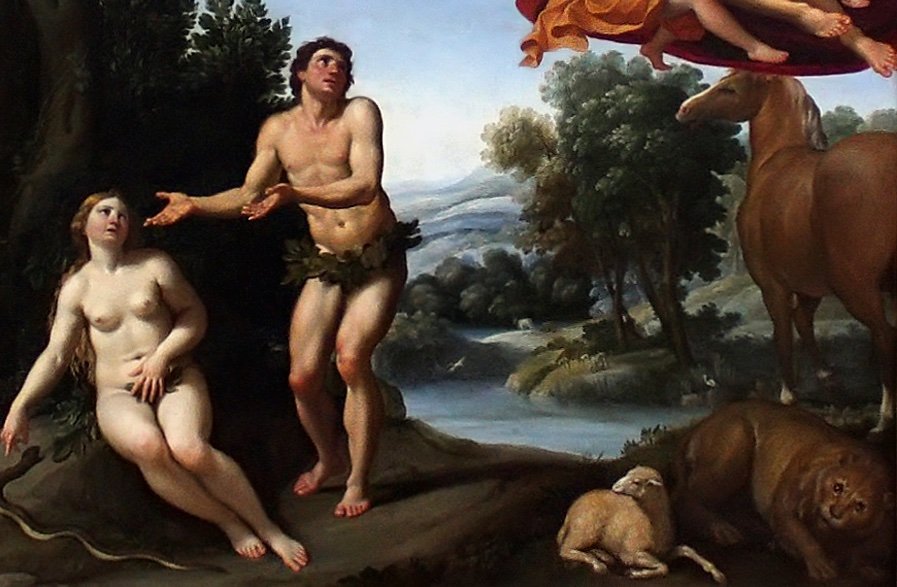The Original Sin
The Original Sin: Deconstructing Adam and Eve Through a Modern Lens
In the annals of history, there’s a tale that reverberates through the corridors of time like an age-old echo. It’s the story of Adam and Eve, the primal couple whose choices in the Garden of Eden allegedly set the stage for millennia of human struggle. When I was a child I was told women experience the pain of PMS and childbirth while men easily enjoy the pleasures of sex because Eve committed the original sin, defied God and ate the apple in the Garden of Eden. As a child that didn’t sit quite right with me. Given the many examples I’d seen of men’s unseemly, boisterous, and nonsensical behavior versus the kindness, consideration, generosity and grit I’d witnessed in contrast to women, I felt it valuable to give this biblical logic some additional analysis. What if we dared to look beyond the surface of fig leaves and forbidden fruit? What if we turned the spotlight away from Eve’s shoulders and shone it squarely on Adam’s?
Let’s consider Adam as the true protagonist of the drama. The patriarchal lens through which this narrative has been scrutinized for centuries has painted Eve as the temptress, the siren luring poor Adam into disobedience. But isn’t it curious how the blame so effortlessly slid off Adam’s shoulders and onto Eve’s, like an ancient game of pass-the-buck?
a masterstroke of centuries-old PR that conveniently shifts culpability from men to women. Adam’s fallibility becomes obscured by the shadows of societal constructs, leaving Eve to bear the weight of her supposed sin alone.
The establishment of patriarchy has been a cunning trick, a masterstroke of centuries-old PR that conveniently shifts culpability from men to women. Adam’s fallibility becomes obscured by the shadows of societal constructs, leaving Eve to bear the weight of her supposed sin alone. It’s a tale as old as time itself—women blamed for the selfish acts of men.
This narrative echoes through the corridors of history, resonating in the glass cliff phenomenon, where women are elevated to positions of power only to be held accountable for the failures orchestrated by a system designed against them. Just as Eve was cast as the catalyst for humanity’s expulsion from paradise, women in leadership positions often find themselves scapegoated for organizational woes they inherited rather than created.
The term "Daddy issues," a convenient label that squarely blames the daughter for acting out when her father was not present, conveniently absolving the absent father of any responsibility.
Moreover, in the disturbing realm of rape culture, men’s lack of impulse control is excused and rationalized, while the blame is unjustly shifted onto women for dressing provocatively or simply existing in certain spaces. It’s a toxic narrative that perpetuates the dangerous notion that women are responsible for men’s actions, no matter how egregious.
And then there’s the troubling trope of Lolita, where an older man becomes besotted by an underage girl. Despite the glaring power imbalance and exploitation inherent in such relationships, the blame is almost always placed squarely on the adult—the woman or girl—while the man is often portrayed as a victim of his uncontrollable desires.
But what if we dared to disrupt this age-old script? What if we peeled back the layers of patriarchal storytelling to uncover the truth buried beneath millennia of biased interpretation? Perhaps we’d find that Adam’s original sin wasn’t simply disobedience, but a failure of accountability—a reluctance to own up to his own choices and their consequences.
In today’s world, where the battle for gender equality rages on, it’s imperative that we revisit these foundational narratives with a critical eye. By challenging the status quo and reclaiming agency over our own stories, we can begin to dismantle the oppressive structures that continue to shape our collective consciousness.
Let’s reimagine Adam and Eve not as archetypes of sin and temptation, but as flawed individuals navigating the complexities of existence. Let’s acknowledge Adam’s role in the fall from grace, not as a condemnation of masculinity, but as a call to accountability.
In doing so, we pave the way for a more equitable future—one where the burden of blame is shared equally, and where the sins of the past serve not as chains to bind us, but as lessons to guide us toward a brighter tomorrow.


